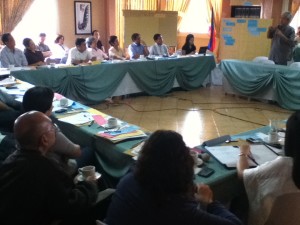Mulat Pinoy’s coverage of the National Anti-Poverty Commission’s “Roundtable Discussion on Anti-Poverty Strategies that Work.” Text and photos by Dante Gagelonia.

NGOs join government institutions and other organizations in discussing poverty reduction strategies.
Cautious optimism and critical analysis were the two most prominent qualities of the consultancy discussion that the National Anti-Poverty Commission (NAPC) held with representatives of the country’s most active non-government organizations and civil society organizations on May 10, 2011 at Fersal Place Hotel in Quezon City. NAPC conducted the round-table discussion to evaluate its current set of plans for alleviating the problem of poverty in the Philippines.
The discussion, “Roundtable Discussion on Anti-Poverty Strategies that Work,” had over 50 attendees, representing various organizations and institutions as well as the NGO community. It was indeed a cross-section of the movers and shakers in an industry that explores all possibilities to help uplift the lives of Filipinos.
Carmela Ariza of NAPC hosted the event, and provided instructions for the gathering of concrete suggestions and ideas from the guests. There were four main lines of inquiry, based on the various presentations:
- What in the NAPC strategy needs further refinement or clarification? What are your recommendations?
- What strategies are effective in combating poverty? What are some of the pitfalls to be avoided?
- How can your sector/organization engage with the NAPC and help in the implementation and localization of the Anti-Poverty strategy? Where in these NAPC focus areas are you present and willing to work with us in our empowerment project?
 What must the government, through its different departments (DA, DAR, DENR, etc.) prioritize or focus on in the next five years to address the pressing concerns/issues of the urban poor, fisherfolk, farmers and indigenous peoples?
What must the government, through its different departments (DA, DAR, DENR, etc.) prioritize or focus on in the next five years to address the pressing concerns/issues of the urban poor, fisherfolk, farmers and indigenous peoples?
The representatives provided their answers over the course of the event, leading up to a rundown of all the ideas submitted during an open forum.
NAPC Undersecretary Florencia Dorotan delivered the opening remarks for the discussion, followed by a presentation of the current draft of the National Anti-Poverty Strategy by Philip Arnold Tuaño, a consultant for NAPC from UNDP-NEDA. The presentation highlighted the core ideas of the strategy, and the attendees were encouraged to provide ideas later on to complement the current crop of plans.
Jesusa Rebete, the director of NAPC’s Local Affairs Coordinating and Monitoring Unit, discussed the Localization Framework. Rebete introduced a “salubungan” system, where plans would be implemented not just from the top-down but from the bottom-up as well. She explained in detail how every strategy would be distinctly tailored to specific areas according to their needs and the existing plans and personnel of the area, such as the preexisting LGUs and CSOs. She also discussed the priority regions, provinces and municipalities in the greatest need of assistance.
Allyn Lopez, another consultant for NAPC from UNDP-NEDA, went over a series of situations where CSOs established best practices for anti-poverty work. He discussed data and progress histories, and presented a video that highlighted the experiences of the Pecuaria Development Cooperative. He also discussed the initiatives of NGOs like SIAD, IPHC, BMFI, KFI and XAES, as well as the activities of CDFO-SC, CODE-NGO LAPP II and PACAP-FOCAS.
Rounding out the discussion and contextualizing the whole endeavor in the bigger picture of national politics and historical development was the role that Secretary Jose Eliseo Rocamora filled. His extensive, qualitative analyses of the government’s plans over the decades, overlaid with his awareness of NGO and CSO work, helped tie everything discussed prior into a complete situational perspective.
After Secretary Rocamora’s talk on the empowerment of the poor was an open forum that yielded substantial input, which was compiled by NAPC for later incorporation into the strategies. NAPC plans on providing the compiled information, along with the full strategy, to the attendees at a later time.
For more information about NAPC and its work, visit their website at http://www.napc.gov.ph/. Check out more photos on Facebook.